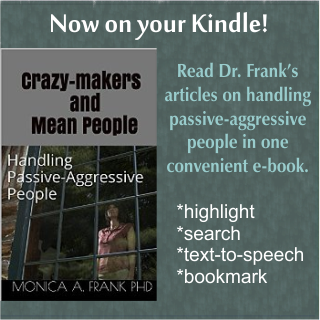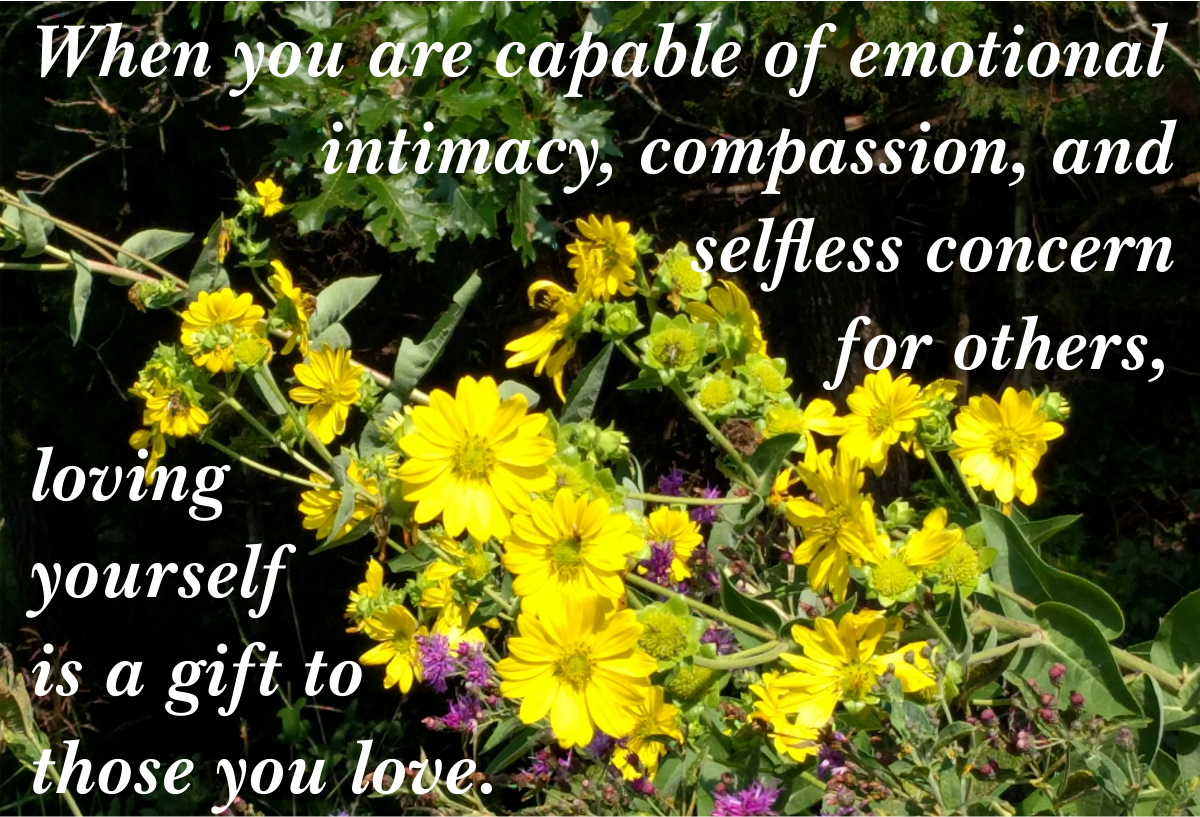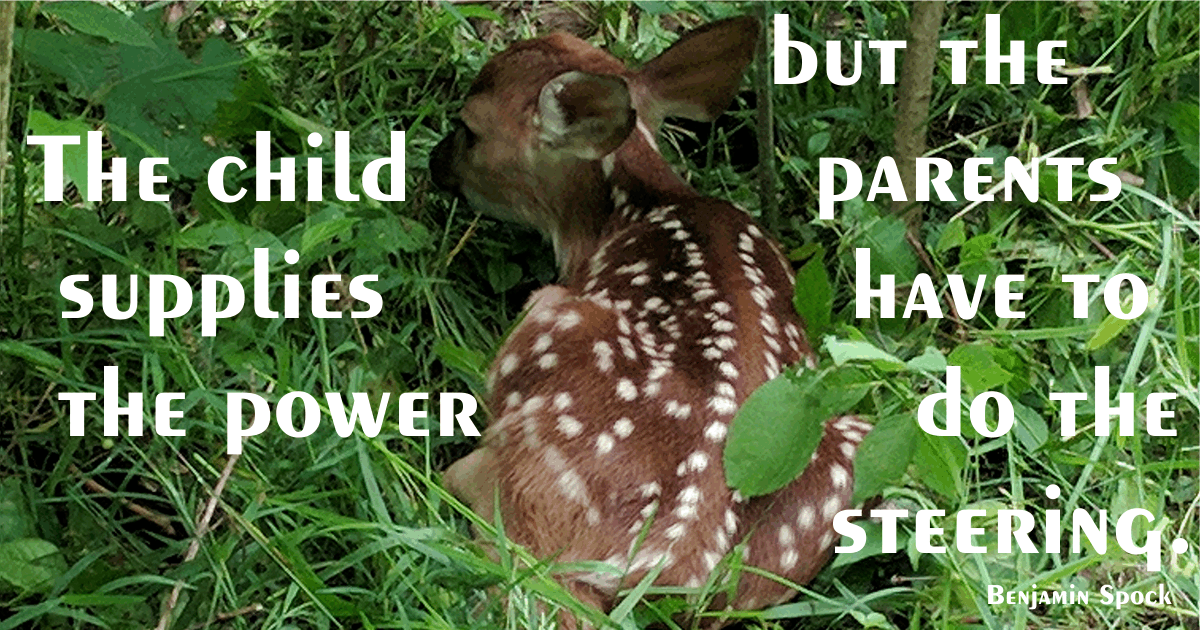










Popular Articles
Crazy-Makers: Dealing with Passive-Aggressive People
Why Are People Mean? Don't Take It Personally!
Struggling to Forgive: An Inability to Grieve
The Secret of Happiness: Let It Find You (But Make the Effort)
20 Steps to Better Self-Esteem
7 Rules and 8 Methods for Responding to Passive-aggressive People
What to Do When Your Jealousy Threatens to Destroy Your Marriage
Guide to How to Set Achieveable Goals
Catastrophe? Or Inconvenience?
Popular Audios
Audio Version of Article: Crazy-Makers: Passive-Aggressive People
Audio Version of Article: Why Are People Mean? Don't Take It Personally!
PsychNotes September 2017
by Monica A. Frank, Ph.D.
Clinical and Sport Psychologist

Index
Previous
Next
September 29, 2017
New Article!
 Emotion training may seem odd to some people: “But it's what I feel! How can I make myself feel different?” It also seems contrary to the idea that all emotions are valid and okay.
Emotion training may seem odd to some people: “But it's what I feel! How can I make myself feel different?” It also seems contrary to the idea that all emotions are valid and okay.
On the surface, the method of emotion training seems to be no different from the demands of others:
“Get ahold of yourself!”
“You're so emotional!”
“You're too sensitive.”
“Can't you control yourself?”
“Stop crying!”
New Article!
Emotion Training: What is it and How Does it Work?
 Emotion training may seem odd to some people: “But it's what I feel! How can I make myself feel different?” It also seems contrary to the idea that all emotions are valid and okay.
Emotion training may seem odd to some people: “But it's what I feel! How can I make myself feel different?” It also seems contrary to the idea that all emotions are valid and okay.
On the surface, the method of emotion training seems to be no different from the demands of others:
“Get ahold of yourself!”
“You're so emotional!”
“You're too sensitive.”
“Can't you control yourself?”
“Stop crying!”
How is emotion training different?
The difference, however, is that emotion training is not focused on blaming the individual. Instead, it teaches methods of evaluating and managing emotions. Several basic principles make it different from the demand to control emotions: Read more...
September 27, 2017
“Doesn't loving myself make me selfish?” Often, those with low self-esteem believe that focusing on the self and their needs is selfish. Many of them may have been raised by narcissists who manipulated and demanded their love: “You are so selfish. You don't care about me at all!"
Yet, those who ask the question, “Doesn't loving myself make me selfish?” are those least likely to be selfish. A narcissist would never ask such a question because the question itself shows a concern for others.
The mental health profession advocates the importance of loving the self and the necessity of good self-esteem especially as a prerequisite for good relationships. Yet, narcissists seem to love themselves and apparently have high self-esteem but often have poor relationships. Obviously, something is wrong with this picture. Read more...
Does Loving Yourself Make You a Narcissist?
Yet, those who ask the question, “Doesn't loving myself make me selfish?” are those least likely to be selfish. A narcissist would never ask such a question because the question itself shows a concern for others.
The mental health profession advocates the importance of loving the self and the necessity of good self-esteem especially as a prerequisite for good relationships. Yet, narcissists seem to love themselves and apparently have high self-esteem but often have poor relationships. Obviously, something is wrong with this picture. Read more...

September 21, 2017
“I'm mad!” the 5-year-old crosses her arms and pouts. “No, you're not mad, honey,” the grandmother responds.
How much does self-doubt play a role in emotion processing for those with Borderline Personality Disorder (BPD)? Many people with BPD have been repeatedly told that their interpretations of emotion, especially negative emotional states such as anger, is wrong.
Even much of the past literature has focused on the theory that those with BPD are particularly sensitive to threat and have a bias towards perceiving anger in others. The DSM-V criteria for BPD states “biased toward negative attributes or vulnerabilities” under “impairments in interpersonal functioning.” In other words, clients with BPD are also told by the mental health profession that they are wrong when interpreting anger or negative reactions in others.
What if, however, as a recent study suggests (Thome et al., 2016) the problem lies not in overestimating the intensity of anger in others but in underestimating the intensity of positive reactions from others combined with a lack of confidence in ability to judge emotions? Read more...
Borderline Personality Disorder and Lack of Confidence When Interpreting Emotions
How much does self-doubt play a role in emotion processing for those with Borderline Personality Disorder (BPD)? Many people with BPD have been repeatedly told that their interpretations of emotion, especially negative emotional states such as anger, is wrong.
Even much of the past literature has focused on the theory that those with BPD are particularly sensitive to threat and have a bias towards perceiving anger in others. The DSM-V criteria for BPD states “biased toward negative attributes or vulnerabilities” under “impairments in interpersonal functioning.” In other words, clients with BPD are also told by the mental health profession that they are wrong when interpreting anger or negative reactions in others.
What if, however, as a recent study suggests (Thome et al., 2016) the problem lies not in overestimating the intensity of anger in others but in underestimating the intensity of positive reactions from others combined with a lack of confidence in ability to judge emotions? Read more...

September 18, 2017
I've written before about how the words used to diagnose mental illness are confused with everyday emotions. There's a difference between depression as a disorder and “I'm feeling depressed today.” Everyday anxiety about an upcoming event and an anxiety disorder cannot be equated.
When everyone is depressed or everyone is anxious it diminishes the suffering of those who have an anxiety or depressive disorder. People equate their momentary angst with the ongoing suffering of those with mental illness and then offer “solutions” that worked for them: “just smile”, “snap out of it”, “look at the bright side.”
Now the same thing seems to be occurring with trauma. When everything is “offensive” and a person can be traumatized by words and college campuses provide safe spaces and counseling when controversial speakers are present on campus, doesn't that diminish the concept of trauma? Read more...
When Everyone is “Traumatized” What Happens to Those Who Are Truly Suffering?
When everyone is depressed or everyone is anxious it diminishes the suffering of those who have an anxiety or depressive disorder. People equate their momentary angst with the ongoing suffering of those with mental illness and then offer “solutions” that worked for them: “just smile”, “snap out of it”, “look at the bright side.”
Now the same thing seems to be occurring with trauma. When everything is “offensive” and a person can be traumatized by words and college campuses provide safe spaces and counseling when controversial speakers are present on campus, doesn't that diminish the concept of trauma? Read more...

September 17, 2017
The purpose of this audio is to help cope with certain emotional states. It can be particularly useful for those with anxiety disorders such as Post-traumatic Stress Disorder (PTSD) or Panic Disorder. In addition, many of those with Borderline Personality Disorder may find it helpful.
The imagery describes building a special place with rooms designed for different emotions: a room that helps you feel peaceful when you are anxious or tense, a room that helps you feel strong and in control when you are fearful, a room that feels comforting when you are sad, a room where you can release anger, a room that helps with concentration and focus, a room that energizes you, a room where you can access your creative energy, hopes, and dreams, and a room designed for restful sleep.
This imagery is particularly useful to learn how to access or manage certain emotions when you are not listening to the audio. By practicing repeatedly, you will begin to pair certain emotions with the imagery of the rooms that you have built. Then you can draw on that pairing by imagining the room which will help you manage the emotion or the state of being that you choose. For instance, if you are taking a test and need to concentrate, you can visually the room you have created for concentration to access that state. When you use this exercise repeatedly, it is best to imagine building the rooms in the same way so that the pairing becomes more powerful. However, you can add detail to the rooms to make them more vivid. For audio...
New Audio: Building Blocks Emotion Training
The imagery describes building a special place with rooms designed for different emotions: a room that helps you feel peaceful when you are anxious or tense, a room that helps you feel strong and in control when you are fearful, a room that feels comforting when you are sad, a room where you can release anger, a room that helps with concentration and focus, a room that energizes you, a room where you can access your creative energy, hopes, and dreams, and a room designed for restful sleep.
This imagery is particularly useful to learn how to access or manage certain emotions when you are not listening to the audio. By practicing repeatedly, you will begin to pair certain emotions with the imagery of the rooms that you have built. Then you can draw on that pairing by imagining the room which will help you manage the emotion or the state of being that you choose. For instance, if you are taking a test and need to concentrate, you can visually the room you have created for concentration to access that state. When you use this exercise repeatedly, it is best to imagine building the rooms in the same way so that the pairing becomes more powerful. However, you can add detail to the rooms to make them more vivid. For audio...

September 12, 2017
 Question:
I am not sure if what I am dealing with is passive aggressive behaviour or not, but it sure hurts. My son suffers from depression and anxiety which have escalated as he gets older. My husband and I helped him through a tough separation and custody battle (he was a father at 19) and all seemed well. Then when he settled into a new relationship it all seemed to slowly sour. He would come up on Christmas Day and fall asleep immediately on the couch, would only grudgingly come to family dinners or birthdays. Yet, if we were five minutes late, it would be a massive complaint about my unreliability.
If I tried to organise to see the grandkids, they would be busy or visiting my mum.
Question:
I am not sure if what I am dealing with is passive aggressive behaviour or not, but it sure hurts. My son suffers from depression and anxiety which have escalated as he gets older. My husband and I helped him through a tough separation and custody battle (he was a father at 19) and all seemed well. Then when he settled into a new relationship it all seemed to slowly sour. He would come up on Christmas Day and fall asleep immediately on the couch, would only grudgingly come to family dinners or birthdays. Yet, if we were five minutes late, it would be a massive complaint about my unreliability.
If I tried to organise to see the grandkids, they would be busy or visiting my mum.
He has worked for my husband in the family business from 16 against my advice, leaving once when he claimed that I "told him to *** off" when in reality I said, "yes, it's all my fault again". He went into a melt down, and I took him to doctors, therapists etc. After about a year he asked to come back to work in the business. He has decided that his insecurity is because of my bad parenting and tells me this often, citing examples as the once that I forgot to pick him up from school.
This has now degenerated to being rude, belittling and dismissive. I have stopped going into the business now. But today I received a text from him detailing how "functioning alcoholic" parents damage children. While he was at home my husband and I probably shared a bottle of wine a night. This text was about a week after the message stating that he wanted a exit plan from the business and I replied that we would help in any way that we could and that I didn't want to lose a son. He replied that it was a little to late for that. He has stopped acknowledging Father's or Mother's Day.
Passive-Aggressive Example: Son with Depression Blames Parents
 Question:
I am not sure if what I am dealing with is passive aggressive behaviour or not, but it sure hurts. My son suffers from depression and anxiety which have escalated as he gets older. My husband and I helped him through a tough separation and custody battle (he was a father at 19) and all seemed well. Then when he settled into a new relationship it all seemed to slowly sour. He would come up on Christmas Day and fall asleep immediately on the couch, would only grudgingly come to family dinners or birthdays. Yet, if we were five minutes late, it would be a massive complaint about my unreliability.
If I tried to organise to see the grandkids, they would be busy or visiting my mum.
Question:
I am not sure if what I am dealing with is passive aggressive behaviour or not, but it sure hurts. My son suffers from depression and anxiety which have escalated as he gets older. My husband and I helped him through a tough separation and custody battle (he was a father at 19) and all seemed well. Then when he settled into a new relationship it all seemed to slowly sour. He would come up on Christmas Day and fall asleep immediately on the couch, would only grudgingly come to family dinners or birthdays. Yet, if we were five minutes late, it would be a massive complaint about my unreliability.
If I tried to organise to see the grandkids, they would be busy or visiting my mum.
He has worked for my husband in the family business from 16 against my advice, leaving once when he claimed that I "told him to *** off" when in reality I said, "yes, it's all my fault again". He went into a melt down, and I took him to doctors, therapists etc. After about a year he asked to come back to work in the business. He has decided that his insecurity is because of my bad parenting and tells me this often, citing examples as the once that I forgot to pick him up from school.
This has now degenerated to being rude, belittling and dismissive. I have stopped going into the business now. But today I received a text from him detailing how "functioning alcoholic" parents damage children. While he was at home my husband and I probably shared a bottle of wine a night. This text was about a week after the message stating that he wanted a exit plan from the business and I replied that we would help in any way that we could and that I didn't want to lose a son. He replied that it was a little to late for that. He has stopped acknowledging Father's or Mother's Day.
September 6, 2017
As children are exposed to more and more media, many parents are feeling more hopeless about protecting their children from inappropriate content. However, an analysis of 57 research studies shows that attempts to manage childrens' media exposure does have some impact on childrens' well-being.
2) Limit time. By limiting the time children are exposed to media, outcomes such as academic performance or physical well-being are improved. Such an outcome is commonsensical because the time is being used for physical activity or homework rather than media usage. Read more...
Effects of Managing Childrens' Media Viewing
Types of managing media viewing
1) Passive co-viewing. When parents view media without any limits or discussion children are more likely to be influenced by the media as parents are giving an unspoken approval of the message. Thus, co-viewing is more likely to lead to increased aggression and fear and poorer academic performance.2) Limit time. By limiting the time children are exposed to media, outcomes such as academic performance or physical well-being are improved. Such an outcome is commonsensical because the time is being used for physical activity or homework rather than media usage. Read more...


















